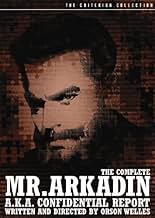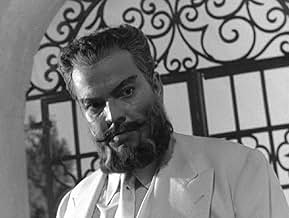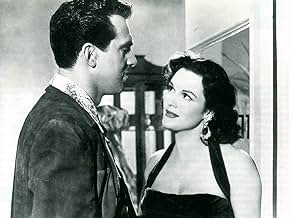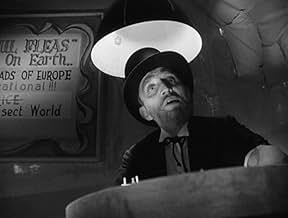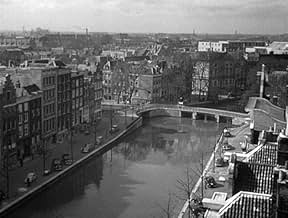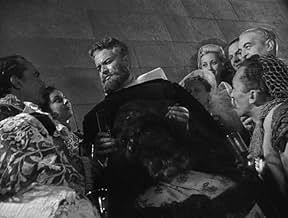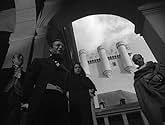An elusive billionaire hires an American smuggler to investigate his past, leading to a dizzying descent into a cold-war European landscape.An elusive billionaire hires an American smuggler to investigate his past, leading to a dizzying descent into a cold-war European landscape.An elusive billionaire hires an American smuggler to investigate his past, leading to a dizzying descent into a cold-war European landscape.
- Awards
- 1 nomination total
- Oscar
- (as O'Brady)
- Woman in Apartment
- (as Tamara Shane)
- Secretary
- (as Terence Langdon)
- Parisian Woman with Bread
- (as Annabel)
- First Munich Policeman
- (as Gert Frobe)
- Second Munich Policeman
- (as Eduard Linker)
Featured reviews
This movie is a mess, but it's a fascinating mess. The movie was taken out of Welles' hands in the editing phase and was released in various cuts all over the world over the course of a decade or more. The version I watched was assembled from all of the various versions, and supposedly most closely resembles what Welles wanted. It's still a slightly confusing jumble, but it's entertaining. It's unlike most movies of the mid 50's, with rapid edits, odd camera angles, and the aforementioned narrative structure utilizing flashbacks.
The sound is either mostly or all post-dub, which also adds to the disorienting effect. This movie has a lot of flaws (several shots are out of focus, Welles' fake nose looks terrible), but I found it an intriguing mystery, and I was never quite certain what was coming, which is exceedingly rare these days. Plus, the many brief appearances of classic character actors, such as AkimTamiroff, Katina Paxinou, Mischa Auer, and Michael Redgrave, all playing bizarre and eccentric characters, is amusing.
Mr. Arkadin refers to the mysterious gazillionaire played by Orson Welles. However Sophia is as elusive at first as the mysterious 'rosebud' in Citizen Kane.
Welles seeing that Arden is a man of wit and resource in the seamier side of life, hires him to find out about Sophia. In fact the story that Welles gives Arden is that before 1927 when he found himself in Zurich, Switzerland with several million francs, he has amnesia and has no memory of his past.
It's obviously a lie because one of the reasons that Arkadin is so mysterious is that he has steadfastly refused to be photographed. Not something someone would normally do unless they had a lot to hide.
Still Arden takes the assignment and it leads to some startling answers and puts Arden's life in peril.
Welles came up short with Mr. Arkadin. It's an intriguing story and has some good performances by the cast members already mentioned and people like Mischa Auer, Akim Tamiroff, Michael Redgrave, and Katina Paxinou from Welles's past. Problem is that Welles seems to be using a lot more in his bag of tricks than is necessary to tell the tale.
A little to arty for art's sake. Still it's an interesting story and well acted.
That's partly because their performances are just that bad, and partly because there is so much else in this movie that works well, or at least strives for excellence. There are a variety of striking images placed before us. Welles' eye for distinctive camera angles and atmospheric lighting was working overtime in this picture. You might quibble with some of his choices as being a tad too melodramatic, but you can't fault him for careful attention to detail. His performance is the usual Welles stuff--overpowering, and perhaps at times almost cartoonish like that of Arden and Medina. But make no mistake: when Welles was cartoonish, it was because he meant to be. Not because that was the only way he knew how to "act." Paolo Mori was also wonderful as as Arkadin's daughter. There were other great characters along the way. Their performances also clash noisily with the wooden hamming from Arden.
And, as others have mentioned, the sound is problematic. Clearly, the movie was overdubbed, and badly, after the fact. In fact, when I first started watching it, I was convinced that it was originally filmed in a foreign language. Nope--something went wrong during filming, it appears, or Welles for reasons of his own decided to re-do all of the sound in the studio after filming. The result is pretty bad. Whether a scene is in a small room, a piazza, an open field, or a vaulted cathedral, the result is the same. Background noise sounds just like that: artificial background noise. The voices sound like they were recorded in a very small, very dead studio. Amateurish and clumsy.
The result is a movie that is, at times, interesting to watch, but it's hard to forget its weaknesses, even for a moment.
One wonders how many times the stagehands had to wrangle a raging Welles off of Arden, prying his hands from the actor's neck, convincing him that murder is illegal, even for a cinematic giant, feeding him rum punch and peanuts, and telling Arden to go hide for fifteen minutes until the anger has passed.
This suspense movie contains intrigue , thrills , plot twists and layered dialog prevail . Excellent acting by the maestro Orson Welles playing the life of yet another ruthless millionaire, he stars a famed tycoon with a shady past , similarly to Citizen Kane . It stars newcomers actors , as the credits read "And introducing Paola Mori" who married Orson Welles ; however, she had been in at least four films prior to this ; the credits also imply the "And introducing" refers to Robert Arden as well, who also had had at least two credited big screen performances . Good support cast as Michael Redgrave as Burgomil , Patricia Medina as Mily , Akim Tamiroff as Jakob Zouk , Mischa Auer , Amparo Rivelles , Katina Paxinou as Sophie , Grégoire Aslan as Bracco , Peter van Eyck as Thaddeus and Suzanne Flon as Baroness Nagel ; but even the efforts of a cool cast couldn't help Welles turn this into a critical or commercial success . Filmed over two years around Europe , required seven years of post production , before finding distribution in 1962 . It has recently released a comprehensive three-DVD set of the film, featuring three versions: the "Corinth" version¨ that was generally regarded closest to Orson Welles's cut, "Confidential Report" or European cut, and the newly edited "Comprehensive" version. Each version contains a few shots or lines that are missing from the other two. Because the film was taken out of Welles' control in post-production, we will never know exactly what he had in mind for the complex flashback structure he spoke of later in his life. Mr. Arkadin was created from three episodes of the 1951-1952 radio program, The Lives of Harry Lime: Man of Mystery , Murder on the Rivera and Blackmail Is an Ugly Word. Arkadin is based mostly on the first of the three and centered on a character named Gregory Arkadian , primary characters and set-ups are taken from the other two episodes . Good cinematography in black and white by Jean Burgoin , as in Citizen Kane is plenty of oblique camera angles . Atmospheric and evocative musical score by Paul Misraki .
Mr. Arkadin also titled Confidential Report was well directed by Orson Welles , a genius who had a large and problematic career . In 1938 he produced "The Mercury Theatre on the Air", famous for its broadcast version of "The War of the Worlds" . His first film to be seen by the public was Ciudadano Kane (1941), a commercial failure , but regarded by many as the best film ever made , along with his following movie , The magnificent Ambersons . He subsequently directed Shakespeare adaptation such as Macbeth , Othelo and Chimes at Midnight or Falstaff . Many of his next films were commercial flops and he exiled himself to Europe in 1948. In 1956 he directed Touch of evil (1958); it failed in the U.S. but won a prize at the 1958 Brussels World's Fair. In 1975, in spite of all his box-office flops , he received the American Film Institute's Lifetime Achievement Award, and in 1984 the Directors Guild of America awarded him its highest honor, the D.W. Griffith Award. His reputation as a film maker has climbed steadily ever since.
The fact that Arkadin connects closely to Kane or Quinlan is obvious and certainly interesting. Although it should seem obvious at this late date that Welles has patterns and themes that reoccur throughout his films. Does this fact still illuminate anything? If anybody questions the fact that Welles is an artist...well, this film will just add to their confusion. But for us believers this film can function like the ritual suffering of the penitents in the film. It hurts so good!
Did you know
- TriviaThe voices of Mischa Auer (The Professor) and Frédéric O'Brady (Oscar) were dubbed by writer, producer, and director Orson Welles.
- GoofsOrson Welles' prosthetic nose disappears when Arkadin meets with Jakob Zouk.
- Quotes
Gregory Arkadin: And now I'm going to tell you about a scorpion. This scorpion wanted to cross a river, so he asked the frog to carry him. No, said the frog, no thank you. If I let you on my back you may sting me and the sting of the scorpion is death. Now, where, asked the scorpion, is the logic in that? For scorpions always try to be logical. If I sting you, you will die. I will drown. So, the frog was convinced and allowed the scorpion on his back. But, just in the middle of the river, he felt a terrible pain and realized that, after all, the scorpion had stung him. Logic! Cried the dying frog as he started under, bearing the scorpion down with him. There is no logic in this! I know, said the scorpion, but I can't help it - it's my character. Let's drink to character.
- ConnectionsEdited into Histoire(s) du cinéma: Fatale beauté (1994)
- SoundtracksSaeta
Performed by Antoñita Moreno.
- How long is Confidential Report?Powered by Alexa
Details
Box office
- Gross worldwide
- $4,528
- Runtime1 hour 33 minutes
- Color
- Aspect ratio
- 1.37 : 1
Contribute to this page


